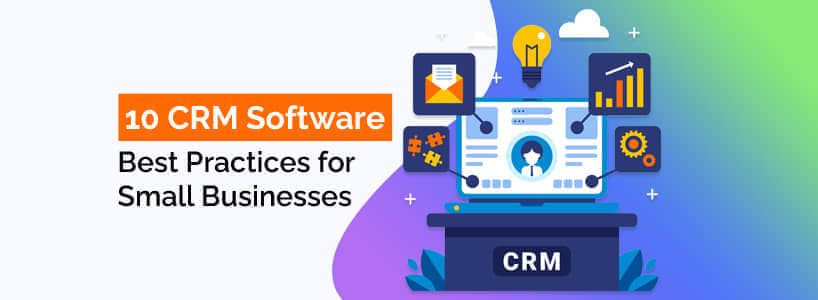10 CRM Software Best Practices for Small Businesses

Customer Relationship Management (CRM) software is a game-changer for small businesses. It streamlines communication, organizes data, and fosters stronger relationships with your customers. But simply having a CRM isn't enough. To maximize its potential, you need to implement best practices that ensure smooth operation and valuable insights.
Here are 10 CRM software best practices to propel your small business forward:
1.Define Your Goals:
Before diving in, clearly define your CRM goals. Do you want to boost sales, improve customer service, or gain deeper customer insights? Aligning your goals with your CRM features helps you choose the right platform and utilize it effectively.
2.Choose the Right CRM :
Not all CRMs are created equal. Research and choose a CRM that caters to your specific needs and budget. Consider factors like scalability, ease of use, integrations with existing tools, and customer support.
Pro Tip:
Utilize resources like "[CRM software for small business]" to compare features and pricing of different CRM solutions.
3.Data is King:
Clean and accurate data is the foundation of a successful CRM. Ensure your team enters complete and up-to-date customer information. Regularly review and remove duplicates to maintain data integrity.
4.Embrace Automation:
Leverage your CRM's automation features to save time and streamline workflows. Automate repetitive tasks like sending follow-up emails, scheduling appointments, and generating reports. This frees your team to focus on building relationships and closing deals.
5.Train Your Team:
Invest in proper CRM training for your employees. A well-trained team can navigate the software efficiently, input accurate data, and leverage its features to their full potential.
6.Make it a Habit:
Regular CRM usage is crucial. Encourage your team to log interactions, update customer profiles, and utilize the CRM as their central hub for all customer communication.
7.Track Your Performance:
CRMs provide valuable data on sales pipeline, conversion rates, and customer engagement. Utilize reports and dashboards to track your progress, identify areas for improvement, and refine your sales and marketing strategies.
8.Personalization is Key:
Segment your customer base based on demographics, interests, and purchase history. This allows for targeted communication and personalized offers, fostering stronger relationships and increasing customer loyalty.
9.Integrate Wisely:
Integrate your CRM with other business tools like marketing automation platforms, email services, and accounting software. This creates a centralized hub for all your customer data, streamlining workflows and improving overall efficiency.
10.Feedback Loop:
Continuously evaluate your CRM strategy and solicit feedback from your team. Are your goals being met? Are there features you're not utilizing? Adapt your approach based on user feedback and industry best practices.
By following these 10 best practices, you can transform your CRM from a simple contact database into a powerful tool that drives sales, enhances customer service, and fuels the growth of your small business.
-
16 September, 2025 at 12:40 amGreat insights! You’ve clearly outlined how CRMs help small businesses manage customer relationships, streamline sales processes, and enhance customer satisfaction. I’d just add that choosing a CRM with strong integrations (like email, calendar, and accounting tools) and a user-friendly interface can make a big difference in adoption and efficiency. Thanks for the helpful insights!
-
28 June, 2025 at 9:33 pmI enjoyed reading this from start to finish!
-
28 June, 2024 at 12:06 amGreat insights! I learned a lot from this post. Thanks for sharing!
-
28 June, 2024 at 12:06 amThis was such an insightful read. Thanks for sharing your knowledge!
-
28 June, 2024 at 12:06 amThis is such a well-written blog post! I love how every idea flows so naturally.
-
27 June, 2024 at 9:19 amYou always write about such interesting topics. Keep going!
-
27 June, 2024 at 9:20 amThis post was really inspiring. Thank you for sharing!
-
27 June, 2024 at 9:19 amI loved this post! So informative and well written.
-
19 May, 2024 at 7:00 amGreat post! I really appreciate the effort you put into this.
-
12 May, 2024 at 5:15 amWhat an inspiring read! I feel motivated after reading this
Add a Comment
Your email address will not be published. Required fields are marked *
Categories
Popular Posts
![A Principals Guide to Managing Schools Efficiently with EduAutomate ERP [thumb]](https://blogimages.weblink.in/a-principal-s-guide-to-managing-schools-efficiently-with-eduautomate-erp-350x128.jpg)
A Principals Guide to Managing Schools Efficiently with EduAutomate ERP
![Manage Products & Services Seamlessly with CRM Inventory Integration [thumb]](https://blogimages.weblink.in/manage-products-services-seamlessly-with-crm-inventory-integration-350x128.jpg)
Manage Products & Services Seamlessly with CRM Inventory Integration
![The Rise of AI-Enabled School ERP: What EduAutomate Does Differently [thumb]](https://www.weblink.in/static/images/blog-no-image.jpg)